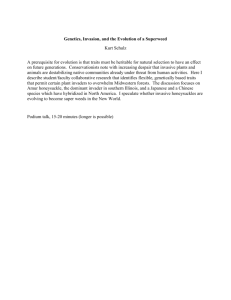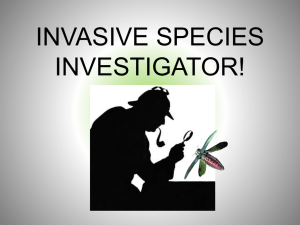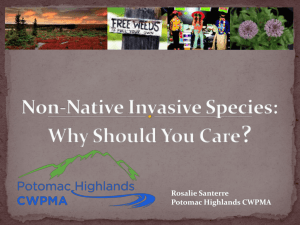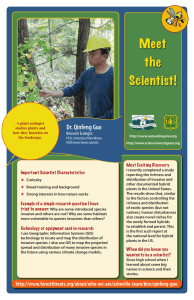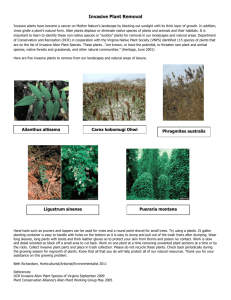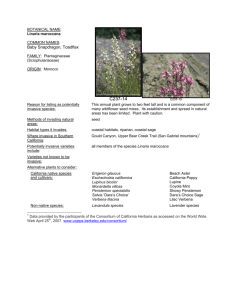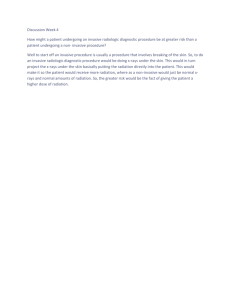Human-Based Spread of Invasive Plants from Powerline Corridors in New York State
advertisement
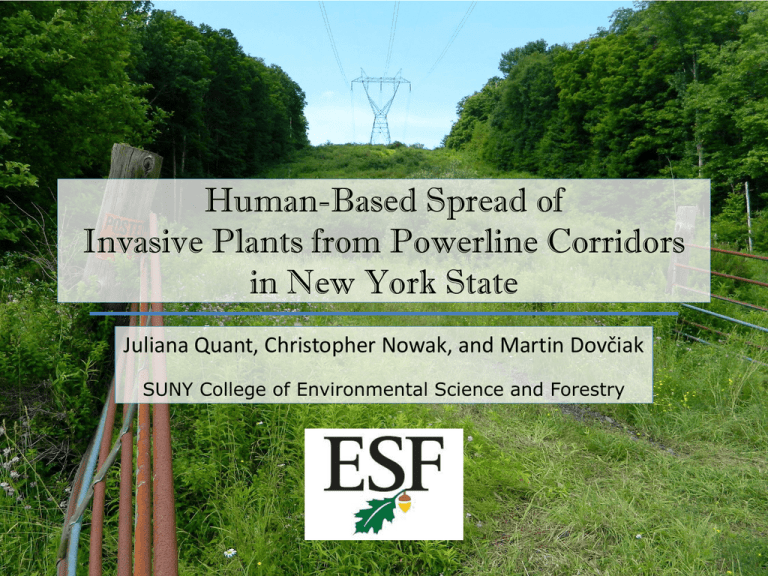
Human-Based Spread of Invasive Plants from Powerline Corridors in New York State Juliana Quant, Christopher Nowak, and Martin Dovčiak SUNY College of Environmental Science and Forestry Ecological context • Invasions (McNeely et al. 2001) – Non-native species establish in a new environment – Spread – Destructive to human interest • Extent of damage (Pimentel et al. 2005) – 700,000 ha/year invaded – Purple loosestrife costs $45 million/year to control Ecological context • Rights-of-way as strip corridors (Forman and Godron 1986) – Differ from the land on either side – Edge and interior – Conduit for plant movement – Sources of biotic effects • Long-distance dispersal events – Highly important (Cain et al. 2000) Vegetation management and unintended movement 3 vector types Past Research • Seed loss over distances – From vehicles on roads in Montana (Taylor et al. 2012) – From hiker’s boots in Britain (Wichmann et al. 2009) • Accumulation during normal activities – Department of Defense vehicles in Montana (Rew 2011, Fleming 2008) – Hiker seed accumulation in Australia (Mount and Pickering 2009) Questions Q1. How many propagules are moved, and how many are invasive species? Q2. How should we approach cleaning vehicles? (Is wash after scrape needed?) How are propagule loading rates affected by ________? Q3. vector Q4. soil drainage Q5. region Bailey’s Ecoregions • Climate, flora & fauna, terrain, soil taxa, disturbance, land use Approach • Accumulation during operational procedures • Sampled particular areas of vectors • Used readily available materials • “Emergence” or seedling growth technique (Gross 1990) Methods Focal species Photo by O. Shevtsova • 39 species: grasses, herbs, shrubs, and trees • Listed as high priority in NY and surrounding states Pastinaca sativa – wild parsnip Lonicera spp. – honeysuckle Lythrum salicaria – purple loosestrife Field processes • Meet crew – 60 sites Field processes • Meet crew • Attach GPS Field processes • Meet crew • Attach GPS • Pre-clean Field processes • • • • Meet crew Attach GPS Pre-clean Vegetation management work Field processes Meet crew Attach GPS Pre-clean Vegetation management work • Sample % assessment • • • • Field processes Meet crew Attach GPS Pre-clean Vegetation management work • Sample % assessment • Collect samples… • • • • Field processes Meet crew Attach GPS Pre-clean Vegetation management work • Sample % assessment • Collect samples… • Vegetation survey • • • • Greenhouse processes Invasive status Invasive Possibly invasive Not invasive Data processes Subsample wt (g) ÷ Sample wt (g) Greenhouse data SCALE UP Sample data All samples % of vector SCALE UP Distance traveled (mi) Whole vector estimates STANDARDIZE Propagules per mile Analysis • Categorical predictor: non-parametric – Mann-Whitney test (2 groups) – Kruskal-Wallis test (3 groups) • Follow-up: Dunn test with Bonferroni corrections (pairwise) • Continuous predictor – Linear and 2nd-order polynomial models • Significant at α=0.1 Results 1. How many seeds are moved, and how many are invasive species? Propagules moved per mile: Vehicles Average invasive spp. 2013 2014 ATV 3.5% 3.2% mower 13.1% 27.6% Propagules moved per mile: Workers Average invasive spp. worker 2013 2014 7.5% 11.7% Which species were moved? Vehicles Workers • A single mature purple loosestrife plant can produce 2.7 million seeds/year. (Thompson et al. 1987) 2. What cleaning approach is appropriate? • Washing after scraping/brushing removes 30-50% of propagules (significant) • Commercial wash units remove about 77% of material (Rew 2011) 3. What difference does vector (worker, type of vehicle) make? worker • • • Vehicles > workers In 2014, mower IE transport > ATV IE transport Other studies – 1800-5000 seeds/mi off-trail for ATVs (Taylor et al. 2011) – 400 seeds on boots and trousers in 100 m of roadside vegetation (Mount and Pickering 2009) 4. What impact does soil drainage have? Effect of soil drainage Vehicles Workers Adjusted R2 0.4501 0.2264 p 0.0004 0.0154 5. What impact does region have? Bailey’s Ecoregions B A AB B AB A A AB • The most invasive species come from the Erie-Ontario Lake Plain • Worker results similar Bailey’s Ecoregions Other factors • Are vegetation and soil wet? • Propagule pressure • Tree density and height • Shrub cover • Season • Herbicide vs. chainsaw use Recommendations and Summary Recommendations based on results 1. Seeds are moved Overall invasive: 6.8% One successful seed can have a big impact Photo by O. Shevtsova – – Lythrum salicaria – purple loosestrife Recommendations based on results 1. Seeds are moved 2. Washing is needed – probably pressure washing. – – Brushing alone misses at least 30-50% of seeds Even professional washes remove only 77% (Rew 2011) Recommendations based on results 1. Seeds are moved 2. Washing is needed 3. Vehicles should be a priority, esp. mowers – Workers move <5% what vehicles move Recommendations based on results 1. Seeds are moved 2. Washing is needed 3. Vehicles should be a priority, esp. mowers 4. Poorly drained sites should be a focal concern Poorly drained site 5/22/14, CE2-9-4-2014 Well drained site 6/4/14, MA-78-2 Recommendations based on results 1. Seeds are moved 2. Washing is needed 3. Vehicles should be a priority, esp. mowers 4. Poorly drained sites should be a focal concern 5. Take region into account Best Management Practices • “Reasonable precautions” – WDNR (Koles and Sievewright 2014) • Permit compliance – NYPA (EEANY 2015) Key points • Scale – Workers move 10s-100s of seeds/mi – Vehicles move 1000s of seeds/mi • Large amount of variation • Science-based BMPs may help Future research • Repeat methods nationally • Structured seasonal sampling • Whole vector cleaning Acknowledgments • ESF team Jennifer Ballard Collin Bartholomew Tinna Chan Kelley Corbine Anna Ganzia Devin Hansen Lacey Kucerak Eva Lonie Gavin MacKellar Quincey Oliver Caryl Peck Paul Picciano Lindsay Rutte Olga Shevtsova Nataliia Shynkarenko • NYPA team Lew Payne Chris Sherwood Peter Woodward John Gwozdz • Lewis Tree Co. crews • EPRI John Goodrich-Mahoney Questions? juliana.quant@gmail.com References • • • • • • • • • • • • • • Cain, M.L., B.G. Milligan, and A.E. Strand. 2000. Long-distance seed dispersal in plant populations. American Journal of Botany 87(9):1217-1227. Environmental Energy Alliance of New York. 2015. New York Utility Company Best Management Practices for Preventing the Transportation of Invasive Species. 13 pp. Fleming, J. 2008. Comparison of Vehicle Washing Systems: Prepared for U.S. Forest Service. 0851-1808—San Dimas Technology & Development Center. U.S. Department of Agriculture, Forest Service, San Dimas, California, U.S. 21 pp. Forman, R.T.T., and M. Godron. 1986. Landscape Ecology. John Wiley & Sons, Inc., New York, New York, U.S. 620 pp. Gross, K.L. 1990. A comparison of methods for estimating seed numbers in the soil. Journal of Ecology 78(4):10791093. Koles, C. and J. Sievewright. 2014. Complying with new regulation: Implementing best management practices for invasive species within utility rights-of-way. In J. Doucet (editor). Environmental Concerns in Rights-of-Way Management. Paper presented at Environmental Concerns in Rights-of-Way Management: 10th International Symposium, Phoenix, Arizona, U.S. (pp. 397-402). Utility Arborist Association, Champaign, Illinois, U.S. McNeely, J.A., H.A. Mooney, L.E. Neville, P.J. Schei, and J.K. Waage (eds.). 2001. Global Strategy on Invasive Alien Species. IUCN. Gland, Switzerland. 50 pp. Mount, A., and C.M. Pickering. 2009. Testing the capacity of clothing to act as a vector for non-native seed in protected areas. Journal of Environmental Management 91:168-179. Pimentel, D., R. Zuniga, and D. Morrison. 2005. Update on the environmental and economic costs associated with alien-invasive species in the United States. Ecological Economics 52:273-288. Rew, L.J. 2011. Developing Functional Parameters for a Science-Based Vehicle Cleaning Program to Reduce Transport of Non-Indigenous Invasive Plant Species. Final Report for Project RC-1545 of the Strategic Environmental Research and Development Program. Alexandria, Virginia, U.S. 58 pp. Taylor, K., J. Mangold, and L.J. Rew. 2011. Weed seed dispersal by vehicles. Montana State University Extension MontGuide, MT201105AG. Taylor, K., T. Brummer, M.L. Taper, A. Wing, and L.J. Rew. 2012. Human-mediated long-distance dispersal: an empirical evaluation of seed dispersal by vehicles. Diversity and Distributions 2012:1-10. Thompson, D.Q., R.L. Stuckey, and E.B. Thompson. 1987. Spread, Impact, and Control of Purple Loosestrife (Lythrum salicaria) in North American Wetlands. U.S. Fish and Wildlife Service. 55 pp. Jamestown, ND: Northern Prairie Wildlife Research Center Online. Accessed 8/18/2015. < http://babel.hathitrust.org/cgi/pt?id=umn.31951p00845336d;view=1up;seq=1>. Wichmann, M.C., M.J. Alexander, M.B. Soons, S. Galsworthy, L. Dunne, R. Gould, C. Fairfax, M. Niggemann, R.S. Hails, and J.M. Bullock. 2009. Human-mediated dispersal of seeds over long distances. Proceedings of the Royal Society B: Biological Sciences 276: 523-532. Focal species list Forbs (herbaceous species) scientific name Alliaria petiolata Centaurea maculosa Cirsium arvense Cynanchum louiseae Glechoma hederacea Heracleum mantegazzianum Lythrum salicaria Pastinaca sativa Polygonum cuspidatum Polygonum perfoliatum Polygonum sachalinense Ranunculus ficaria Rumex acetosella Solanum dulcamara Tussilago farfara common name garlic mustard spotted knapweed Canada thistle black swallow-wort ground ivy giant hogweed purple loosestrife wild parsnip Japanese knotweed Asiatic tearhumb / mile-a-minute weed giant knotweed fig buttercup common sheep sorrel climbing nightshade coltsfoot observed? field only field and greenhouse field and greenhouse field only field only no field and greenhouse field and greenhouse no no no no field only field only field only Grasses scientific name Bromus tectorum Microstegium vimenium Phragmites australis Poa compressa common name downy brome stiltgrass common reed Canada bluegrass observed? greenhouse only greenhouse only field only no Shrubs scientific name Berberis thunbergii Elaeagnus angustifolia Eleagnus umbellata Euonymus alatus Ligustrum vulgare Lonicera maackii Lonicera morrowii Lonicera tatarica Rosa multiflora Rosa rugosa Rubus phoenicolasius common name Japanese barberry Russian olive autumn olive burning bush European privet Amur honeysuckle Morrow's honeysuckle Tartarian honeysuckle multiflora rose rugosa rose wineberry observed? field only no field only no no no field and greenhouse field only field only no field only common name Norway maple tree of heaven glossy buckthorn princesstree common buckthorn black locust observed? no field only field only no field and greenhouse field only common name Oriental bittersweet Japanese honeysuckle kudzu observed? field only field only no Trees scientific name Acer platanoides Ailanthus altissima Frangula alnus Paulownia tomentosa Rhamnus cathartica Robinia pseudoacacia Woody vines scientific name Celastrus orbiculatus Lonicera japonica Pueraria montana
